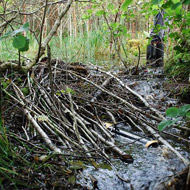
Creatures blamed by residents for causing flash flooding
Beavers are not to blame for flash flooding and are beneficial to the environment, say researchers from the University of Stirling.
Residents in Perthshire, Scotland, believe the animals built dams upstream which were swept downstream by torrential rain last year.
Now a study into the ecology and habitat engineering of beavers has found that the creatures can reduce downstream flooding. It also found that they can improve biodiversity and minimise pollutants.
“Our study found that beaver behaviours have several benefits for the environment,” said lead researcher Dr Nigel Willby. ”Their dam building skills help restore degraded streams and increase the complexity of the surrounding habitat, consequently increasing the number of species found by 28 per cent. The dams also help improve pollutant levels and store flood water.”
Beavers were blamed for causing flash flooding when torrential rain devastated the village of Alyth in July 2015. In the week following the flooding, The Scotsman reported that several residents had seen wood in the Altyth Burn which bore tooth marks from beavers.
In response to the concerns, Scottish Natural Heritage launched an investigation into the causes of flooding. That found that all beaver dams located along the stream network feeding into the Alyth Burn were intact. Experts observed only minor damage to a few dams, which beavers had repaired with mud.
“There was no sign of current beaver activity in the den itself,” said a Perth & Kinross council spokesperson. “While much of the flood borne timber has been debarked and could appear to have been associated with beaver felling, close inspection found an absence of characteristic beaver tooth marks on the wood. This indicated that the loss of bark had been caused by abrasion against rocks and trees rather than by beavers.”
The University of Stirling led study examined head water streams which drain water from hectares of Scottish countryside. They compared areas where beavers had been active with areas in which they were absent.
Results showed that the interconnected pools created by the beaver dams increased the retention of organic matter by up to seven times. They also found that the level of aquatic plant life increased 20 fold.
Furthermore, levels of agricultural pollutants were reduced in areas occupied by beavers, with concentration of phospherous halved and nitrate levels lowered by more than 40 per cent.
“We discovered that dams helped restore local biodiversity, but also had value for nutrient retention and storage of water during flood peaks, suggesting benefits downstream,” added Dr Willby. “The beavers’ engineering is therefore transforming low quality habitats in regions where the animal has long been absent. These benefits, however, must be weighed against the potential for occasional negative impacts on fisheries, forestry and farm crops.
“With decisions on the beaver’s future in Scotland set to be made in the coming months, this research opens up an important dialogue on the pros and cons of reinstating these animals to the Scottish countryside.”
Image (C) Patrick Mackie



 The Veterinary Medicines Directorate (VMD) is inviting applications from veterinary students to attend a one-week extramural studies (EMS) placement in July 2026.
The Veterinary Medicines Directorate (VMD) is inviting applications from veterinary students to attend a one-week extramural studies (EMS) placement in July 2026.